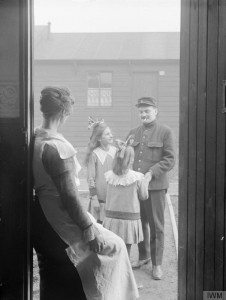The Centre for Hidden Histories is proud to announce a two day Conference and Community Showcase, entitled Beyond the Western Front: The Global First World War to take place at the Albert Hall Conference Centre, Nottingham, 1st and 2nd July 2016

Through a combination of academic papers, workshops and creative performances, this free conference will examine different understandings of the war and seek to provide a broader cosmopolitan context in which to place the British First World War orthodoxy. We seek representation from a variety of national, faith and other emerging communities whose histories are rarely considered, and for whom the traditional Armistice Day celebrations may have strikingly different meanings.
The existence of a First World War beyond the Western Front is a critical element of the Centre’s thematic interest and the conference would be intended to examine this in an open and discursive manner. We are actively seeking contributions from community groups and academic researchers.
It is hoped that the debates at the event will prompt further research and collaboration between academics and communities. Where possible, prompts to the AHRC Connected Communities, Care for the Future and Global Uncertainties themes will be made.
The conference will explore four major themes:
- The Lives of ‘Others’
We are looking for contributions that examine the experiences of those whose war was fought outside the western trenches; at home and around the world. This embraces not only the combatant roles of Asian and African troops in European and non-European theatres but also the important contribution of labour. All the combatants enlisted labour for the myriad heavy duties to supply and maintain front lines. There are few monuments to labourers. The Great War was also a global war at sea, and a large number of merchant seamen were non-Europeans.
- The War as Global Revolution
The war was one of the most significant moments of change in recent history. We want to examine the global impact of these changes, in the destruction of old orders, the raising of new ones and in the development of new ways of living. This raises the question of periodisation e.g. the ‘1914-18 war’ so often projected; or, in the language of the UK Allied Victory medal ‘The Great War for Civilisation 1914-1919’; but what of the perspective from other parts of the world, eg. Turkey – should it be 1911 to the Treaty of Lausanne 1923? What is rather obvious is that the Great War did not end with the ‘Armistice’ or with the Paris treaties, but turned to revolution with sustained violence and destruction on a large scale across a large part of the world.
- We Are Making a New World: The lives of those who survived
In remembering the fallen, did we forget the even greater numbers who came home? We are interested in proposals that will examine the challenges faced by the men, women and children who lived into the peace. There were not many ‘memorials’ for those who survived the war, but there were memories and psychological damage on a large scale.
- Different Memorial Cultures
With the war now lost to living memory, cultures of remembrance are the primary methods by which people engage with it. We are looking for contributions that illuminate and explore the very different cultures of remembrance across national, ethnic and social groups.
Potential topics include, but are not limited to:
- The impact of defeat
- The impact of victory
- The questioning of religious belief as a result of war
- From 1914 to When? The question of periodisation
- ‘Enemy aliens’ and the impact of war on minority communities
- The concept of the refugee from 1914 to the present day
- Migration and resettlement
- The First World War and the founding of nation states
- War and the growth of the power of the State
- Total war and attempts to retreat from this in the early 1920s.
- Postwar independence movements
- The First World War and the creation of the modern Middle East
- The impact of continuity on British national attitudes
- The First World War in the twenty first century
- Unknown Warriors: the creation of mass memorials
- Memorial traditions in different cultures and territories
- The changing heroic ideal
- War and the changed roles and positions of women, and not just in the industrial states.
- Influenza, a pandemic and the single largest demographic disaster of the 20th century. To what extent the flu was a result of the war?
Format
We invite proposals for workshops, 20-minute papers, performances, or posters. Other creative responses or discussion and debate formats will also be considered.

We accept applications from individuals, community groups and academic researchers from any discipline, with an interest in relevant topics. The Centre would particularly welcome proposals that involve collaborations between community groups and academics.
Please send a brief description of no more than 300 words outlining the topic you wish to share and your preferred format of presentation.
Submissions should be made to hiddenhistories@nottingham.ac.uk by 29th January 2016.
Informal enquiries welcome.